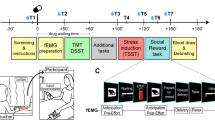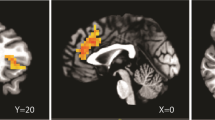Abstract
THE behavioural effects of “frustrative nonreward”1 (that is, the omission of an expected reward) seem to be particularly sensitive to certain drugs, notably sodium amylobarbitone and alcohol2–4. A study of the effects of adrenocorticotropic hormone (ACTH) on this kind of behaviour began recently in this institute. This hormone, although it is quite different pharmacologically from amylobarbitone and alcohol, turns out to resemble them5–8 in blocking two complex behavioural consequences of frustrative nonreward : the partial reinforcement acquisition9–11 and extinction12 effects. The two partial reinforcement effects are observed when an animal's response is rewarded or not rewarded in an unpredictable manner; both were blocked by 8 IU of ACTH injected during training only13.
This is a preview of subscription content, access via your institution
Access options
Subscribe to this journal
Receive 51 print issues and online access
$199.00 per year
only $3.90 per issue
Buy this article
- Purchase on Springer Link
- Instant access to full article PDF
Prices may be subject to local taxes which are calculated during checkout
Similar content being viewed by others
References
Amsel, A., Psychol. Rev., 69, 306 (1962).
Miller, N. E., in Animal Behaviour and Drug Action (edit. by Steinberg, H.), Ciba Foundation Symposium (Churchill, London, 1964).
Wagner, A. R., in Current Research on Motivation (edit. by Haber, R. N.), (Holt, Rinehart and Winston, New York, 1966).
Gray, J. A., Adv. Sci., 23, 595 (1967).
Gray, J. A., J. Comp. Physiol. Psychol., 69, 55 (1969).
Ison, J. R., and Pennes, E., J. Comp. Physiol. Psychol., 68, 215 (1969).
Wagner, A. R., J. Exp. Psychol., 65, 474 (1963).
Nelson, P. B., and Wollen, K. A., Psychon. Sci., 3, 135 (1965).
Goodrich, K. P., J. Exp. Psychol., 57, 57 (1959).
Haggard, D. F., Psychol. Rec., 9, 11 (1959).
Gray, J. A., and Smith, P. T., in Animal Discrimination Learning (edit. by Gilbert, R. M., and Sutherland, N. S.) (Academic Press, London, 1969).
Lewis, D. J., Psychol. Bull., 57, 1 (1960).
Gray, J. A., Mayes, A. R., and Wilson, M., Intern. J. Neuropharmacol. (in the press).
Author information
Authors and Affiliations
Rights and permissions
About this article
Cite this article
GRAY, J. Effect of ACTH on Extinction of Rewarded Behaviour is blocked by Previous Administration of ACTH. Nature 229, 52–54 (1971). https://doi.org/10.1038/229052a0
Received:
Revised:
Issue Date:
DOI: https://doi.org/10.1038/229052a0
This article is cited by
-
The effect of ACTH on habituation of the turning reaction in the toadBufo bufo L.
Journal of Comparative Physiology ? A (1979)
Comments
By submitting a comment you agree to abide by our Terms and Community Guidelines. If you find something abusive or that does not comply with our terms or guidelines please flag it as inappropriate.



